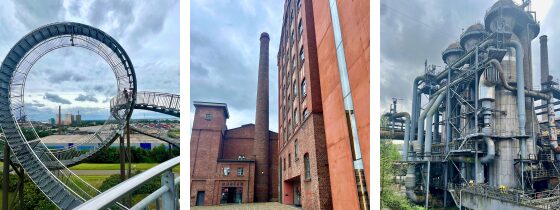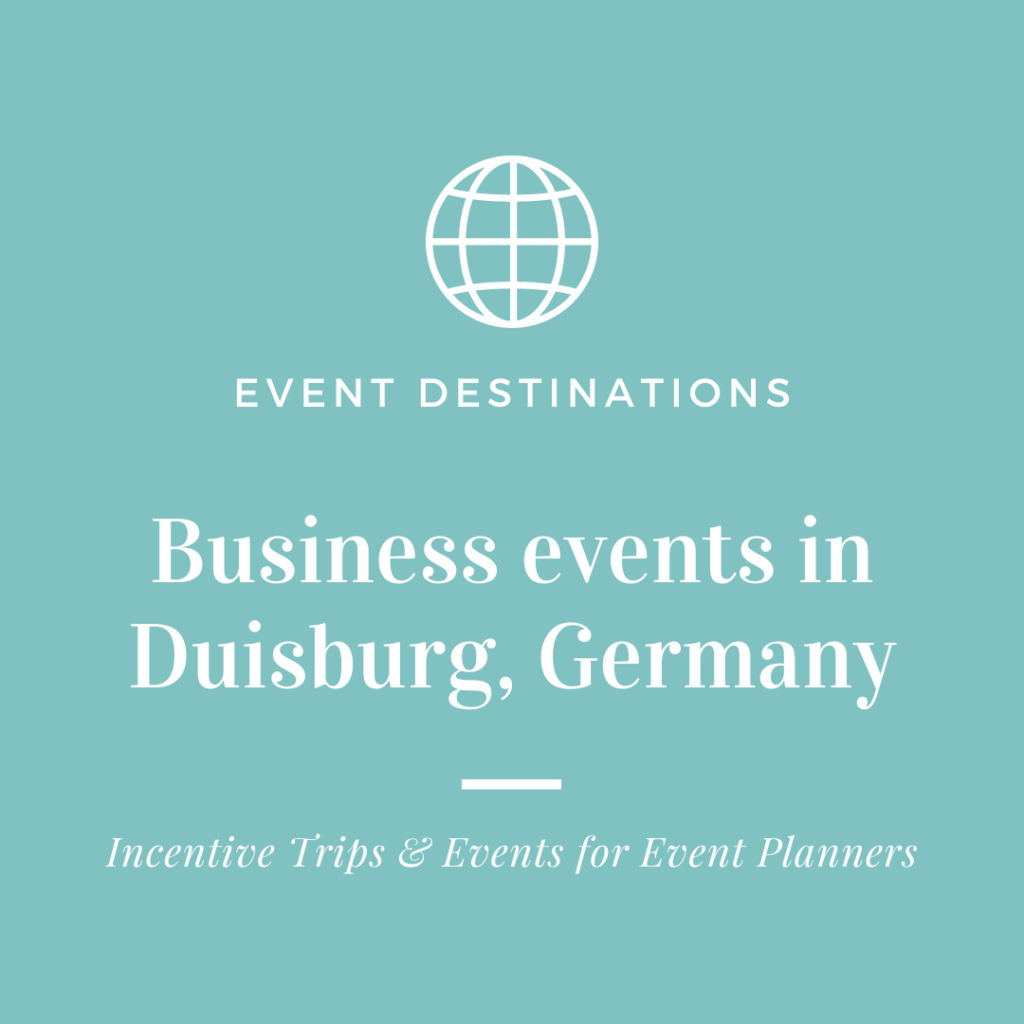Duisburg. Beautiful? Mmm. Inspiring? Absolutely!
The Backstory
Eurostar’s recent merger with Thalys is shaking up the MICE market, making sustainable travel to European events easier than ever. This merger has also put some lesser-known spots on the map, perfect for those tired of over-touristed destinations.
Take Duisburg, for example. Once an industrial giant, it’s transitioning into a cultural hub and a surprising sustainable city. For the adventurous event planner, Duisburg offers a blend of rich industrial history, vibrant culture, and reclaimed attractions thanks to a series of unlikely transformations.

The Look & Feel
Nestled in Western Germany’s Ruhr region, Duisburg is part of the country’s largest urban area, renowned for its industrial heritage. At first glance, it might not seem like an ideal events destination, but recent decades have seen a creative transformation of its infrastructure into unique attractions. Plus, it boasts excellent connectivity (did you know Duisburg is Europe’s key hub for Chinese trains? In fact, on maps in China, the only German cities often highlighted are Berlin and Duisburg, with Duisburg sometimes even printed a bit bigger!).
For those looking to transport delegates, Eurostar offers a smooth and sustainable option. We travelled from London to Brussels, grabbed a few obligatory waffles, then made our connection through Cologne, arriving in Duisburg later than afternoon. It’s a journey that combines sustainability with the chance to go slower, with a touch of adventure too.
Duisburg’s steel industry boomed in the mid-19th century, thanks to railway construction and abundant coal and iron ore resources, plus its prime spot by the Rhine and Ruhr rivers. But by the mid-1950s, the coal crisis hit, followed by the steel crisis in the 1970s, leading to a big drop in demand and leaving lots of empty industrial sites.
So, what do you do with industrial wasteland? Sure, you could bulldoze it and start over. But Duisburg took a more imaginative and sustainable approach. The city’s blast furnaces, gasometers and winding towers have been transformed into venues for leisure activities, music festivals, sports and events. It’s a creative way to breathe new life into old structures.
The Vibe
Venues & Spaces
Landschaftspark
Opened to the public in the early 1990s, this landscape park was designed to help people connect with Duisburg’s industrial past. The 200-hectare site, once home to collieries and steelworks, now features grand, rusting blast furnaces and slag heaps transformed into a stunning public space. Trees have been planted, cycle lanes created and a former gasometer has been turned into Europe’s largest indoor diving center. Storage bunkers now house Germany’s largest climbing garden, attracting about a million visitors every year.
A steel staircase winds up and around Blast Furnace 5, offering close-up views of the massive iron and steel works. Keep climbing, and you’ll be rewarded with panoramic views of the city. At night, the site is illuminated by a spectacular light installation by British artist Jonathan Park, bathing the ironworks in a sea of light and colour.
The ironworks provide a unique backdrop and atmosphere for events, with three main venue spaces. The Power Plant, an industrial cathedral, can host up to 4,200 people. The Blower House Complex features five halls, each with its own ambiance, complete with wind compressors, intricate pipework, and elegant lighting. The Casting House is ideal for open-air events with a cushion roof for bad weather, perfect for concerts. The Switch Room offers a memorable seminar space for up to 25 people, surrounded by the equipment of the former control room. The parkland, a blend of old ironworks and green areas, can host events with up to 15,000 visitors.
Küppersmühle
Located in a historic grain mill on the dockside, the MKM Museum Küppersmühle is a highlight of Duisburg’s transformed inner harbour, now buzzing with lively waterfront restaurants based on plans by architect Sir Norman Foster. The museum’s exterior features classic bricks and a peaceful courtyard with sycamores. But the real drama is inside, thanks to a recent extension by Herzog and de Meuron (the team behind Tate Modern). They’ve preserved the massive historic silos and integrated them into the new structure, making it one of Germany’s biggest private art galleries and a breathtaking space to host events. The event spaces offer striking views over Duisburg’s inner harbor, the largest inland port in the world, with options for private dining for up to 160 guests, all surrounded by incredible post-war art.
Tiger & Turtle Magic Mountain
For more amazing views of the region’s industrial past and present, Tiger and Turtle is the place to be. Standing 21 meters tall, this public art piece is best described as the world’s slowest roller coaster; a sculpture you can walk on. Built in 2010 during the Ruhr area’s tenure as European Capital of Culture, it won a competition to find a landmark for the artificial hill made from soil and rubble of a former zinc smelter. At night, 800 LED lights illuminate the sculpture, inviting visitors to take a different approach and appreciate something usually fast (a roller coaster, represented by the tiger) in a slower, more deliberate way (at the pace of a turtle). As you climb, the wind picks up, making you more aware of the natural world around you. It’s a great spot to inspire teams looking to approach things differently.
The Sustainability
Duisburg stands as an inspiring example of sustainable urban development. A significant part of Duisburg’s 114 km of water frontage has been transformed from underused industrial wasteland to a vibrant, diverse urban environment. The city is committed to maintaining and expanding its industrial and logistics sectors by adopting climate-neutral technologies and fostering green hydrogen infrastructure. Accessibility is another key feature. The city boasts excellent train connections throughout Europe, making it convenient for those seeking event destinations via eco-friendly transport. Within the city it’s pedestrian-friendly, combined with well-planned tram networks providing efficient transportation across its neighbourhoods.
What to Do
- Take a harbor cruise past rows of warehouses once used to unload ships.
- Learn about the importance of shipping at the Museum of German Inland Navigation, housed in an old Art Nouveau swimming pool.
- Experience opera or ballet at The Duisburg Theater, one of the city’s most striking buildings and home to the Duisburg Philharmonic Orchestra.
- Discover Duisburg’s greener side with hiking tours through the forests, streams, and lakes in the town’s south.
- Explore the Rheinpreussen settlement, built to house miners from Silesia, Austria-Hungary, and the Netherlands. After the decline in mining, the settlement was saved from demolition by a citizen initiative. Today, it is a listed building, with its residents owning the homes.
Where to Stay
Mercure Hotel Duisburg City
Rating: 4 stars
Located near the city’s main attractions, including the Inner Harbor and the theater district, the Mercure Hotel Duisburg City is a great option for business travellers. The hotel features stylish rooms, a restaurant serving international cuisine and a bar. Guests can also enjoy an indoor swimming pool and sauna. Meeting facilities are available for business events.
IntercityHotel Duisburg
Rating: 3 stars
For those seeking convenience and value, IntercityHotel Duisburg is an excellent option. Located just steps away from the main train station, this hotel provides easy access to public transport. Rooms are modern and well-equipped, and guests receive a complimentary city travel pass for the duration of their stay. The hotel also offers a breakfast buffet and a bar.
Hotel Landhaus Milser
Rating: 4 stars
For a more tranquil experience, Hotel Landhaus Milser is located on the outskirts of Duisburg, offering a peaceful retreat with a touch of luxury. The hotel is set beside a lake and surrounded by greenery, making it perfect for nature lovers. It features elegantly furnished rooms, a fine dining restaurant and a wellness area with a sauna and fitness facilities.
How to Get There
It’s easy to travel by train to Duisburg with regular Eurostar trains leaving London daily, taking you from city centre to city centre via a connecting train in Brussels offering the option to combining it with a stop-over or two for a dual-destination event experience. There are also numerous rail connections across Europe.
Interested in learning more about how to hosting Duisburg business events or incentive trips in Duisburg? Reach out to the Evolve Events team today. We possess the experience and local knowledge to assist you with venue finding, activities and logistics to create unforgettable experiences.
TEL : 020 7610 2808 – EMAIL : anna@evolve-events.com

